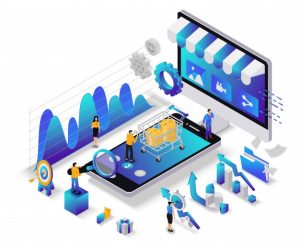In the past two decades, mobile applications have completely revolutionized our lives in ways that few could have anticipated when smartphones first became popular in 2007 with the launch of Apple’s iPhone 3G. Since then, mobile applications have changed the way we work, how we shop and entertain ourselves, as well as how we interact with each other through social media networks and messaging services.
How We Work With Mobile Apps
Mobile applications have drastically changed the way we work, making it easier to collaborate with others in real-time and access information on the go. Businesses are now able to communicate quickly and efficiently with their employees, customers, and partners while on the move. Mobile applications also allow businesses to streamline processes such as invoicing, accounting, project management and customer service by providing an easy-to-use interface that simplifies complicated tasks.
These days, mobile apps can support a variety of different functions, from office productivity to customer relationship management and analytics. With the emergence of cloud-based applications, businesses are increasingly able to access powerful software tools without having to install them on their own systems.

Communication and Entertainment Apps
The rise of mobile apps has also made it easier for us to stay connected no matter where we are in the world. Messaging services like WhatsApp provide a secure platform for users to chat with friends and family without having to worry about costs or time zones. Additionally, entertainment apps like Netflix have made it possible for us to watch our favorite shows on the go without being tied down by TV schedules or limited cable packages.
Shopping and Banking With Mobile Apps
Mobile applications have also changed how we shop and manage our finances. Online shopping apps like Amazon make it easy for us to find whatever products we need at any time of day or night; banking apps allow us to make payments, check our balance, and transfer money without having to visit a physical bank branch; and investment apps allow us to manage our investments anytime, anywhere.
Mobile applications have changed the way we shop by giving us access to a wide range of products and services at our fingertips. In addition to providing us with more options for purchasing goods and services online, mobile apps also make it easier for us to compare prices across different retailers and find discounts or promotions that may not be available in physical stores. Additionally, many retail stores now offer specific rewards programs that allow customers who shop through their app or website to access exclusive deals or discounts.
Social Media and Networking
Mobile apps have also made it much easier for us to keep up with what’s happening in the world and stay connected with others. Social media applications like Facebook and Instagram allow us to share our lives with friends and family across the globe; networking apps like LinkedIn make it easier for professionals to connect online; and dating apps like Tinder make it possible for people to find potential partners near them.

The Future of Mobile Applications
The impact of mobile applications on our lives has been immense, but the future promises even more exciting possibilities. In the upcoming years, we can expect mobile applications that are able to deliver greater convenience through artificial intelligence (AI), augmented reality (AR) capabilities, voice-activated commands, smart home technology integration and more. This will open up new opportunities for businesses as well as individuals in terms of how they work, shop, communicate with each other or entertain themselves.
Conclusion
Mobile applications have profoundly changed our lives. From making it easier to work and shop remotely to providing more efficient ways of communicating and entertaining, mobile applications are now an integral part of modern society. As technology continues to evolve, things like AI, AR, and voice control will be added to mobile apps, taking convenience and user experience to the next level.
The development of mobile applications has also opened up new opportunities for businesses, allowing them to reach a large number of potential customers and expand their market reach. Companies can now create custom-made apps that are tailored specifically for their customers’ needs, which makes it easier for them to increase sales, build brand loyalty and strengthen customer relationships. In summary, mobile applications have transformed the way we work, play and shop by granting us greater convenience in our daily activities. This shift has revolutionized businesses by providing an effective platform for reaching out to new customers and engaging with existing ones. As technology continues to evolve rapidly in the coming years and decades, there is no doubt that mobile applications will continue to shape our lives in unimaginable ways.






